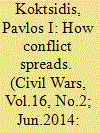| Srl | Item |
| 1 |
ID:
133581


|
|
|
|
|
| Publication |
2014.
|
| Summary/Abstract |
This article examines the escalation of protest mobilization into armed conflict in the Republic of Macedonia (2001). The analysis argues that violence occurred because of a timely collusion between proximate causes and permissive conditions (causes). The state's inherent fragility and the perpetuation of unresolved grievances provided ground for the utilization of opportunity structures by dissident contestants. The study looks into the influence of spillover effects through the lens of contagion and diffusion effects including political radicalization, disputed borderlands refugee flows, and rebel capacity, and provides an assessment of the conditions shaping the decision of the Albanian rebels to use violence. Drawing from a series of elite interviews and documents, the article offers a critical insight into how ethno-regional interdependencies render a largely non-violent conflict susceptible to escalation. The study finds that contagion, disputed borderlands, and the availability of existing operational networks have played a crucial, if not decisive, role in the decision of politically active Albanians in the Republic of Macedonia to use violence.
|
|
|
|
|
|
|
|
|
|
|
|
|
|
|
|
| 2 |
ID:
193122


|
|
|
|
|
| Summary/Abstract |
Conflict points around the world involve government forces fighting terrorist groups. In this type of warfare, there is a danger that counterterrorist efforts may backfire, providing ammunition for additional cycles of violence. We study this issue focusing on selective and indiscriminate house demolitions employed by Israel during the Second Intifada. We exploit the temporal and spatial variation of this policy to assess its impact on Palestinians’ political views. We find that the civilian population does not react to punitive house demolitions, a selective form of counterterrorism. On the contrary, Palestinians are more likely to adopt more radical political opinions in response to precautionary house demolitions, an indiscriminate form of counterterrorism. We also show that political radicalization induced by indiscriminate counterterrorism leads to an increase in future terror attacks. Overall, our analysis provides explicit empirical support to the mechanism behind the positive correlation between indiscriminate counterterrorism and future levels of violence.
|
|
|
|
|
|
|
|
|
|
|
|
|
|
|
|